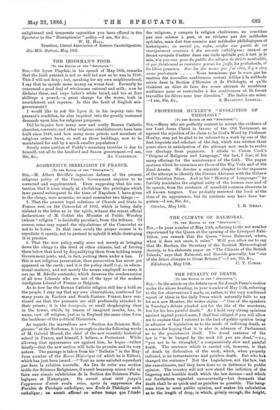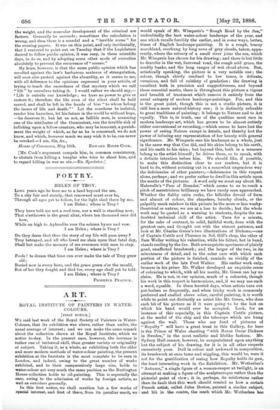THE PENALTY OF DEATH.
[TO THE EDITOR OF THE " EIPECTLTOR.")
S IR, —In the article on the debate upon Sir Joseph Pease's motion under the above heading, in your number of May 15th, referring to the few observations I made, or, rather, to the very condensed report of them in the daily Press which naturally falls to my lot as a new Member, the writer states :—" One of the speakers in Tuesday's debate pleaded not for the life of the murderer, but for his less painful death." As I hold very strong opinions against capital punishment, I shall feel obliged if you will allow me to explain that I referred to the fact of public opinion being in advance of legislation as to the mode of inflicting death, as a reason for hoping that it is also in advance of Parliament as to the punishment itself. The dread sentence of the law is "to be hanged by the neck till you are dead,"—i.e., "you are to be strangled," a comparatively slow and painful death. The sentence which is carried out, however, is that of death by dislocation of the neck, which, when properly inflicted, is an instantaneous and painless death. But who has changed the sentence P Not the Legislature, not the law, but the executioners, and they have done so in deference to publics opinion. The country will not now stand the infliction of the lingering and horrible death which the law decrees—and which our forefathers regarded unconcernedly—but demands that death shall be as quick and as painless as possible. The hang. man tries to meet public opinion, and makes his calculation as to the length of drop, in which, grimly enough, the height,
the weight, and the muscular development of the criminal are factors. Generally he succeeds ; sometimes the calculation is wrong, and then there is a scandal and a "terrible scene" for the evening papers. It was on this point, and only incidentally, that I ventured to point out on Tuesday that if the Legislature desired to follow public opinion, it was easy, in these scientific days, to do so, and by adopting some other mode of execution absolutely to prevent the recurrence of " scenes."
My hope, however, is that the same public opinion which has revolted against the law's barbarous sentence of strangulation, will soon also protest against the absurdity, as it seems to me, with all deference to the opinions expressed in your article, of trying to teach the sacredness of that mystery which we call "life" by ourselves taking it. I would rather we should say,— ' Life is outside our knowledge ; we have no power to give or restore it ; therefore the life even of the vilest shall be held sacred, and shall be left in the hands of him "to whom belong the issues of life and death."' Let the murderer be isolated, render him harmless, let his future in the world be without hope, —he deserves it; but let us not, as fallible men, in assuming one of the attributes of the Omniscient, run the terrible risk of inflicting upon a fellow-creature, who may be innocent, a punish- ment the weight of which, as far as he is concerned, we do not know, and which, however much we may wish it to be, can never be revoked.—I am, Sir, &c.,
House of Commons, May 18th, EDWARD RIDER COOK.
[Mr. Cook's argument compels him, in common consistency, to abstain from killing a burglar who tries to shoot him, and to regard killing in war as sin.—En. Spectator.]



































 Previous page
Previous page